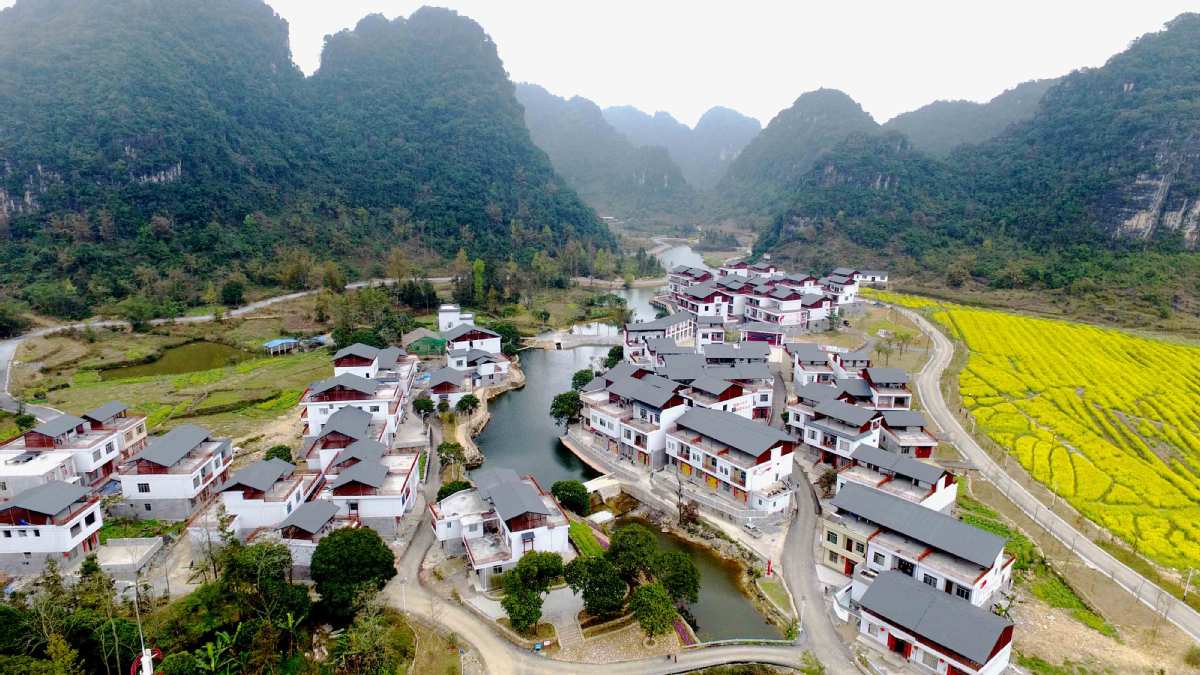Socialism with Chinese Characteristics for a New Era and the World

Reliance on and service to the people have been the fundamental tenet of the CPC since its founding.
It is no exaggeration to say that almost every news story in Japan these days, either by foreign or local media, has something to do with China. Ever since Biden took office, the U.S. has been rallying its allies – Japan, Australia and various European countries – to join it in putting pressure on China. Ironically, the more the U.S. pits itself against China, the stronger China’s presence in the world becomes. On the contrary, the U.S. is exposing the decline of its unipolar hegemony.
It has been said for more than 30 years that the end of the Cold War marked the victory of capitalism. But after the global financial crisis, excessive financial inflation and the intensification of the money game have fanned the flames of capitalist greed, leading to countless messes that are generating a rising popular misgiving. In this chaotic era, where capitalism sees no light at the end of the tunnel, I truly feel that a major historic change is drawing close.
Meanwhile, the first milepost in China’s Two Centenary Goals will be reached in July, when the Communist Party of China (CPC) celebrates the centenary of its founding. Before the arrival of this historic watershed, I would like to reflect somewhat on the messages that China has sent to the world and their significance.
“Socialism with Chinese characteristics” can encapsulate all thinking on China. The path of China’s revolution from the founding of the CPC in 1921 to the founding of the People’s Republic of China in 1949; the transition phase from New Democracy to socialism; from Reform and Opening-up to Socialism with Chinese Characteristics for a New Era, where China pursues greater heights in the development and building of a modern socialist country: each of these eras and phases have had ideas, philosophies, strategies and specific measures that defined them. What remained constant was their Chinese characteristics, which gives the hundred-year history of the CPC world-historical significance. Put differently, this was the key to the victory of the Chinese Revolution and today’s achievements in the development of Chinese society.
In short, a fact-based approach.
Although Marxism, which has its roots in Western Europe, expounded truth, victory would have been impossible if theories had been indiscriminately applied regardless of facts. Even after the historic success of the October Revolution (1917) that eventually led to the founding of the Soviet Union, China did not copy Soviet practices, but rather sought to understand the actual suffering of the people, and relied on the people to stand firm against imperialist aggression and free China from semi-feudal rule. In so doing, China took an indescribably arduous path. The CPC made huge sacrifices, overcame countless ordeals, weathered the Long March, established revolutionary bases and set down roots in the countryside. Based on analysis of the prevailing realities, the Party formulated strategic tactics, and united and mobilized farmers, workers and ordinary people to build a new China. Behind all these was a path of struggle that was fused with the spirit, culture, social systems and popular sentiment born of China’s historical traditions.
The history of the Chinese revolution remains highly relevant to the modern world.
Here, there is the lesson that social contradictions cannot be resolved simply by drawing upon the experiences of other nations, as well as of the importance of fact-based approaches and reliance on the people.
There are approximately two folds of the significance of Socialism with Chinese Characteristics for a New Era.

First, it can provide experience for developing countries in Asia, Africa and Latin America that have yet to find a clear path of economic development that can free them from poverty. Many of them were once the colonies of imperialist powers. Although they have since gained independence, particularly after the Second World War, imperialist rule and exploitation had left them with weak foundations for economic and industrial development, as well as a multitude of intractable challenges in state governance. China’s experiences in achieving its development miracle can provide some insights and are highly relevant to them. The Belt and Road Initiative is a key pathway in this respect.
President Xi Jinping has said that “the Belt and Road, namely the Silk Road Economic Belt and the Maritime Silk Road of the 21st Century, represent paths towards mutual benefit which will bring about closer economic integration among the countries involved, promote development of their infrastructure and institutional innovation, create new economic and employment growth areas, and enhance their capacity to achieve endogenous growth and to protect themselves against risks.” (The Governance of China, Volume I, page 348). “Capacity to achieve endogenous growth” is the operative phrase here. The Belt and Road Initiative is a carrier, whereas cooperation between China and other countries is a catalyst for awakening the potential of these nations and spurring their peoples to rise up and do their all in blazing a new path of economic development.
Developing countries are now rapidly joining the competition in the global value chain, leading to a global transition from “vertical” to “horizontal” division of labor. As such, it is the BRI principles of extensive consultation, joint contribution and shared benefits that are truly aligned with ruminations and strategies regarding a world order for a new era in the 21st century. By no means is this limited to the economic aspect; pluralistic international cooperation mechanisms like the Shanghai Cooperation Organization also promote peaceful co-existence between nations.
The Belt and Road Initiative, founded upon the unique brand of socialism that China is committed to, maps out a comprehensive blueprint for a new world, from the economy to security. For centuries, the ancient Silk Road was a conduit for commercial and cultural exchanges between East and West. China’s profound history in deepening mutual understanding between different civilizations will come into full play in the present era.
At the same time, Socialism with Chinese Characteristics for a New Era can also provide important lessons for capitalism, which is at its wit’s end despite all efforts to the contrary. I have a feeling that China will be drawing a new model for the society to be built in the future.
Modern capitalism is plagued by countless contradictions that are only just emerging, while there has also been a global “rediscovery” of Marxism in recent years. Given this trend, the development of economic and social institutions, the exploration of novel institutional designs in fields such as the environment and culture, as well as the deepening of policy science, have become urgent imperatives.
Today, China has fully eradicated poverty and is devoting its energies to becoming an even stronger socialist nation in the new era. There is no doubt that China will build a society of abundant wealth shared by all. Neither is there any doubt that the underlying socioeconomic systems and governance approaches will provide insights for the societal systems of a post-capitalist era. Three questions are of particular significance. How should a balance be struck between public ownership and the private sector, so as to build a vibrant and dynamic society? How to replace one-sided focus on economic development with a sustainable, eco-friendly social development model? What should a global economic order that benefits all nations and peoples look like?
On these topics, the road that China paves will provide valuable experience and be a trailblazer for world development. It will show that what China advocates in the new era is not limited to industry and technology, but also encompasses innovative concepts spanning domains such as social institutions, the natural environment, culture and governance. The accumulation of these wisdoms, experiences and policies will be a public good, not only for China, but for the entire world in the 21st century. I think this is another significance of Socialism with Chinese Characteristics for a New Era.

Last but not least, I want to stress that the world is exhausted with the dog-eat-dog nature of capitalist avarice. In contrast, reliance on and service to the people have been the fundamental tenet of the CPC since its founding. People-centered ideas, philosophies, conduct and strategies will be immeasurably important in future society.
A community with a shared future for humanity, an initiative that President Xi has advocated globally, envisions a world free of conflict where all human beings can co-exist in peace and share prosperity. I deeply feel that the process of building this ideal world brings us ever closer to Marx’s conception of a world where human beings are liberated from the contradictions and constraints of old social and production relations.
In this year’s New Year speech, President Xi mentioned the CPC centenary: “Its 100-year journey surges forward with great momentum. Its original aspiration remains even firmer one hundred years later.” President Xi goes on to mention how the first CPC Congress was stopped by the government of the day and had to shift from Shanghai to a tourist boat in the South Lake in Jiaxing, a city in Zhejiang Province: “the small red boat (where the first CPC Congress concluded) bore the great trust of the people and the hope of the nation. The boat has sailed through turbulent rivers and treacherous shoals, and has voyaged across violent tidal waves, becoming a great ship that navigates China’s stable and long-term development.”
These emotional words sum up the journey of the CPC and the Chinese people, a truly turbulent odyssey of triumph over trial and tribulation. Looking back on the struggles of brave men and women over the past century, I deeply hope that China’s future generations can contribute strength and wisdom to a better world in the 21st century.
Kimura Tomoyoshi is a former NHK anchor from Japan.
This article was first published by People’s China.
 Facebook
Facebook
 Twitter
Twitter
 Linkedin
Linkedin
 Google +
Google +










